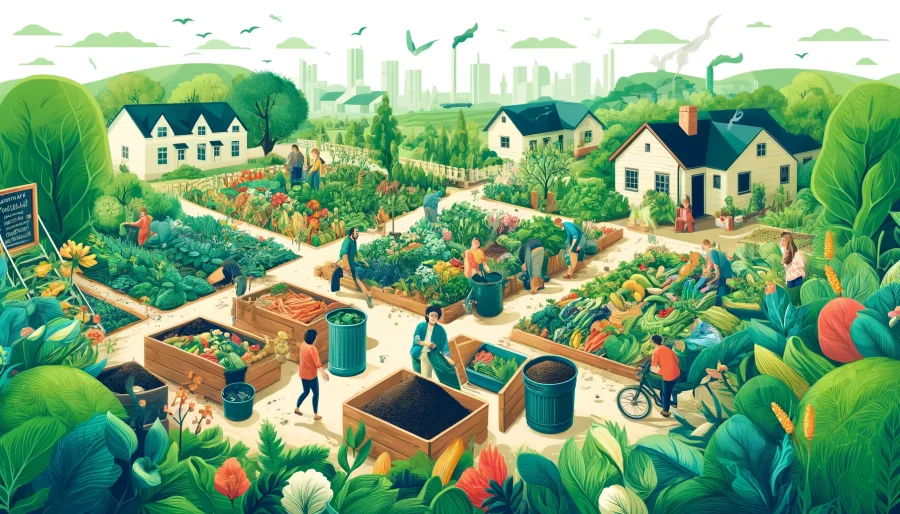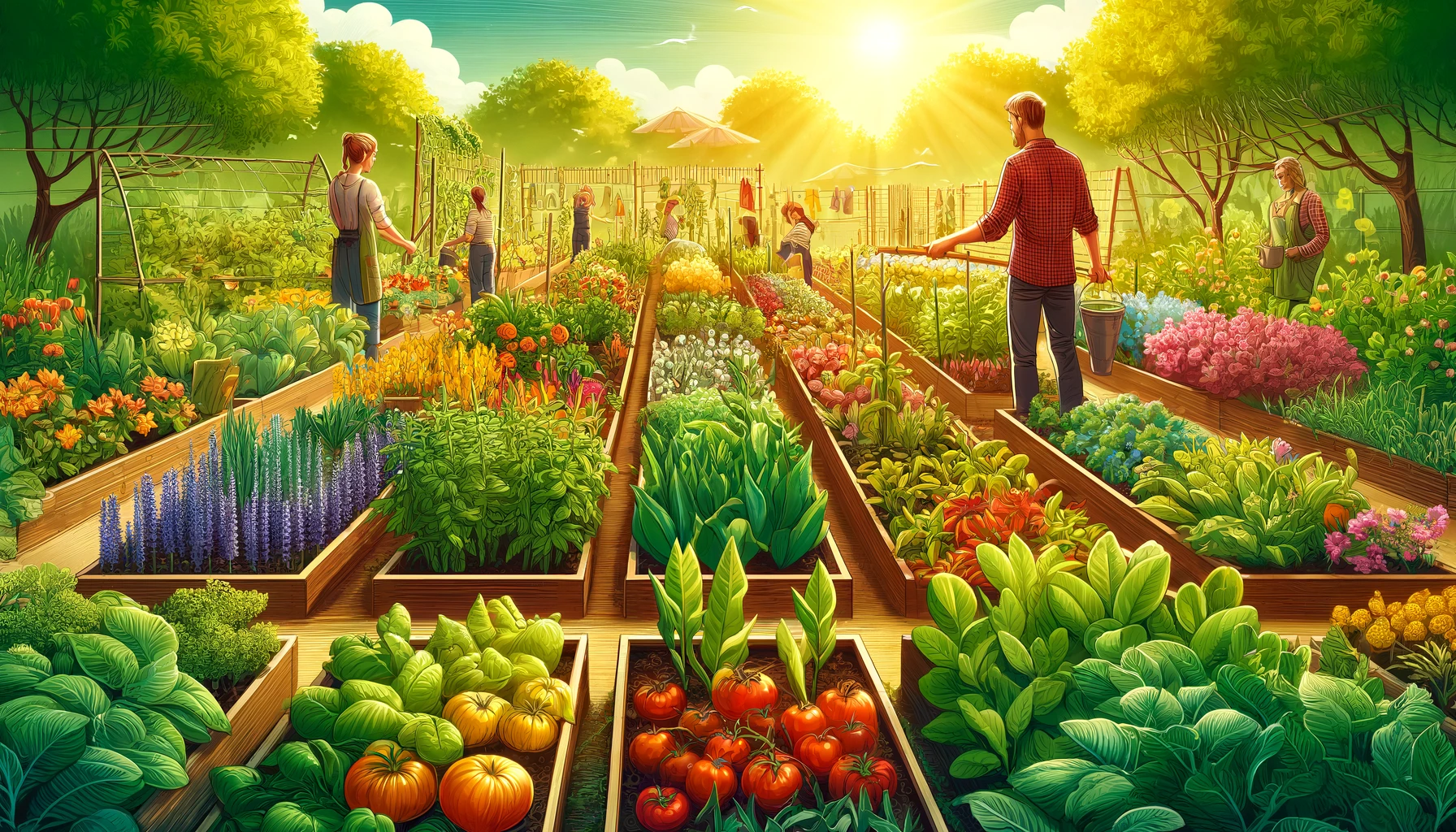Section 2: Social Benefits
Let’s talk about the social perks of community garden composting.
It’s not just about dirt and plants—it’s about bringing people together, educating the community, and making our neighborhoods better places to live.
Community Engagement and Education
Community composting is a fantastic way to get folks involved and learning about sustainability. Here’s how it helps:
- Educational Opportunities: Community composting offers a chance for everyone to learn about sustainable practices.
- Youth Programs: Many gardens have programs for kids, teaching them the value of composting and gardening.
- Community Workshops: Workshops can bring people together to share knowledge and boost environmental awareness.
Revitalizing Neighborhoods
Turning empty lots into lush green spaces with composting can really spruce up a neighborhood. Here’s why it’s awesome:
- Beautification: Composting can turn vacant lots into vibrant, beautiful gardens.
- Community Pride: These green spaces make neighborhoods look better and foster a sense of pride.
- Gathering Spaces: Gardens provide a place for people to gather, chat, and enjoy some fresh air together.
Food Security
Composting doesn’t just make soil better—it helps grow food right in the community. Here’s how:
- Nutrient-Rich Soil: Compost improves soil quality, which in turn boosts local food production.
- Urban Gardening: Better soil means more successful urban gardens, helping to address food deserts.
- Success Stories: Many community gardens have increased access to fresh produce, helping neighbors eat healthier and feel more connected to their food.
Section 3: Economic Benefits
Alright folks, let’s dive into the economic perks of community garden composting.
It’s not just good for the environment and our communities—it’s also a real money saver and job creator!
Cost Savings
Community composting can save a pretty penny by cutting down on waste disposal and the need for pricey chemical fertilizers. Here’s the scoop:
- Reduced Waste Disposal Costs: Less waste means lower costs for getting rid of trash.
- Savings on Fertilizers: Using compost instead of chemical fertilizers can save a lot of money.
- Financial Benefits for All: These savings benefit both local governments and individual residents, freeing up funds for other community projects and personal needs.
Creating Jobs
Composting programs aren’t just about the dirt—they’re also about jobs. Here’s how they create green job opportunities:
- Green Jobs: Composting programs generate jobs that are good for the environment and the community.
- Entrepreneurial Opportunities: Many small businesses thrive by focusing on composting services and products.
- Success Stories: Look at initiatives like BK ROT in Brooklyn or the Baltimore Compost Collective, which provide jobs and training for local youth while turning waste into valuable compost.
Economic Resilience
Keeping the composting process local helps build a stronger, more resilient economy. Here’s why:
- Local Economic Benefits: When composting stays local, so do the financial benefits. This supports small businesses and local farmers.
- Sustainable Food Systems: Local composting helps create a sustainable food system, making communities less dependent on external resources.
- Community Support: By keeping the benefits within the community, composting programs help ensure economic stability and growth.
By making composting a part of our local economy, we not only help the environment but also build a stronger, more resilient community.
Section 4: Practical Tips for Community Composting
- Choosing the Right Composting System
- Overview of different composting methods like three-bin systems, windrows, and vermicomposting, and their suitability for various community sizes (EPA, Uncle Jim’s Worm Farm).
- Include pros and cons of each method to help readers decide what might work best for their community garden.
- Managing Common Challenges
- Tips for preventing odors, pests, and other common issues (MSU Extension, Uncle Jim’s Worm Farm).
- Share best practices for maintaining compost quality and ensuring good relations with neighbors.
- Engaging the Community
- Strategies for involving community members, such as hosting workshops, events, and volunteer days (EPA, ILSR).
- Encourage sharing composting success stories and benefits with the community to build support.
Section 4: Practical Tips for Community Composting
Ready to get your hands dirty and start composting in your community garden?
Here are some practical tips to help you choose the right system, manage common challenges, and get everyone involved.
Choosing the Right Composting System
Picking the right composting method is key to success. Here’s a quick overview of the most popular systems:
Three-Bin Systems:
- Great for larger gardens. One bin for fresh scraps, one for turning compost, and one for finished compost.
- Pros: Easy to manage stages of composting.
- Cons: Takes up more space and requires regular turning.
Windrows:
- Long, low piles turned regularly. Ideal for gardens with lots of organic material.
- Pros: Handles large volumes, good aeration.
- Cons: Requires space and regular maintenance.
Vermicomposting:
Using worms to break down organic waste. Perfect for smaller spaces and indoor composting.
-
- Pros: Fast decomposition, minimal odor.
- Cons: Worms need specific care and conditions.
Managing Common Challenges
Even the best composting systems can run into issues. Here’s how to keep things running smoothly:
- Preventing Odors: Balance green (nitrogen-rich) and brown (carbon-rich) materials, and turn the compost regularly to aerate it.
- Pest Control: Avoid adding meat, dairy, and oily foods. Use bins with lids and fine mesh to keep pests out.
- Quality Maintenance: Keep compost moist but not soggy. Turn it regularly and monitor the temperature to ensure it’s breaking down properly.
- Good Neighbor Relations: Educate your community about composting benefits and practices. Share compost and success stories to keep everyone on board.
Engaging the Community
Getting your community involved is crucial for a successful composting program. Here’s how to do it:
- Host Workshops: Educate community members about composting techniques and benefits. Hands-on workshops are a great way to get people excited.
- Organize Events: Plan composting days where everyone can pitch in and learn. Make it a fun, social event!
- Volunteer Days: Encourage regular volunteer days to maintain the compost system and garden. It’s a great way to build community spirit.
- Share Success Stories: Highlight the positive impacts of composting in your community garden. Share stories of how composting has benefited the garden and the community.
By following these tips, you can create a thriving community composting program that brings people together and benefits the environment. Happy composting!
Community Garden Composting Benefits Conclusion
Well folks, we’ve dug deep into the world of community garden composting, and it’s clear that the benefits are plentiful.
From improving our environment to bringing people together and saving money, composting is a powerful tool for positive change.
Let’s wrap things up with a quick recap and some key takeaways.
Recap
Community garden composting is a game-changer. By reducing waste, enriching soil, fostering community bonds, and boosting local economies, it’s a win-win for everyone involved. Here’s a quick rundown of what we’ve covered:
Environmental Benefits
- Reducing landfill waste and methane emissions
- Improving soil health with essential nutrients and better water retention
- Promoting biodiversity through a healthy ecosystem of microorganisms
Social Benefits
- Engaging and educating the community
- Revitalizing neighborhoods with beautiful green spaces
- Enhancing food security with local, nutrient-rich produce
Economic Benefits
- Saving money on waste disposal and chemical fertilizers
- Creating green jobs and entrepreneurial opportunities
- Supporting local businesses and fostering economic resilience
Practical Tips
- Choosing the right composting system for your community’s needs
- Managing common challenges like odors and pests
- Involving the community through workshops, events, and volunteer days
Key Takeaways
- Composting transforms waste into valuable resources.
- It enriches soil, making it healthier and more fertile.
- Community composting strengthens social bonds and boosts local engagement.
- Economic benefits include cost savings and job creation.
- Practical tips help ensure a successful composting program.
Call to Action
Now it’s your turn! Whether you’re a seasoned gardener or just getting started, you can make a big difference by starting or supporting a community composting initiative in your area.
Gather your neighbors, set up a composting system, and watch your community thrive.
Read more: Community Gardens Benefits: How To Start a Community Garden
Alrighty, folks, till next time—take good care of yourselves and your gardens. Keep it green, and I’ll see y’all later!
Community Garden Composting Benefits Resources
Howdy folks! If you’re as excited about community garden composting as I am, you might be looking for more information to get started or to take your composting to the next level.
Here are some great resources to help you out, including further reading and local composting programs.
Further Reading
Local Composting Programs
- BK ROT: A youth-powered composting service in Brooklyn, NY. They offer services and training for local composting. BK ROT
- Baltimore Compost Collective: A community-based composting service providing job training and food access programming. Baltimore Compost Collective
- Composting Association of Vermont: Offers support and resources for community composting projects in Vermont. Composting Association of Vermont
These resources are packed with useful information and can help you get started with or improve your community composting efforts. Happy composting, and keep it green!



